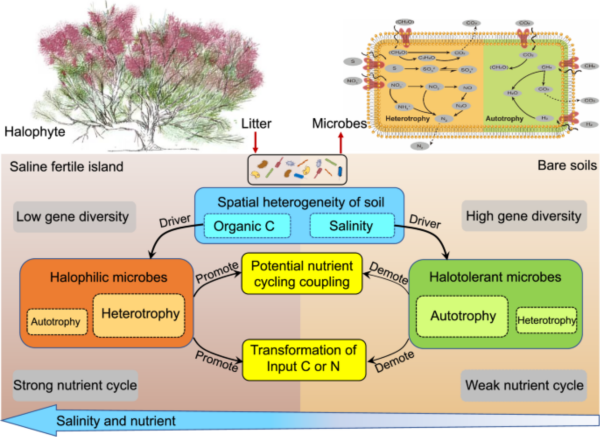Researchers Uncover Pivotal Role of Halophyte-induced Saline Fertile Islands in Driving Soil Nutrient Cycling
2024-09-18
Halophytes, salt-resistant plants, are commonly found in arid regions around the world. These plants can form "saline fertile islands" beneath shrubs, creating unique ecological niches for soil microorganisms. However, their impact on soil nutrient cycling, mediated by these microorganisms, has remained unclear.
In a study published in Communications Biology, a research team led by Prof. TIAN Changyan from the Xinjiang Institute of Ecology and Geography (XIEG) at the Chinese Academy of Sciences investigated the functional characteristics of soil microorganisms within halophyte-induced islands across three distinct arid ecosystems near the Taklimakan Desert, China.
The researchers found that halophyte-induced islands provide a favorable habitat for halophilic archaea, and revealed that specific groups of these halophilic archaea possess genes related to the utilization of carbon, nitrogen, and sulfur, indicating their potential to enhance coupled cycles of various elements.
In addition, the researchers found that the halophilic archaea exhibit flexible metabolic adaptations that allow them to thrive in highly variable soil conditions, resulting in increased carbon use efficiency and enhanced nitrogen transformation.
"Halophyte shrubs can act as hotspots for halophilic microbes, boosting nutrient cycling through microbial-biogeochemical transformations in saline soils," said ZHAO Shuai, first author of this study.
This study offers new insights into the essential role of halophyte shrubs in shaping biogeochemical dynamics in arid ecosystems by profoundly influencing soil halophilic archaea.
Article link:https://www.nature.com/articles/s42003-024-06741-1

Conceptual Infographic: interactions induced by halophyte shrub saline fertile islands (Image by XIEG)
Contact
LONG Huaping
Xinjiang Institute of Ecology and Geography
E-mail: longhp@ms.xjb.ac.cn
Web: http://english.egi.cas.cn



